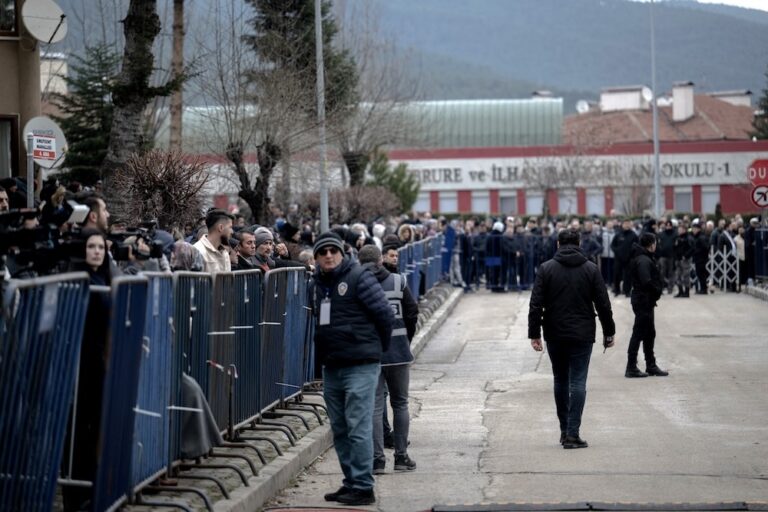(WiPC/IFEX) – International PEN is watching with growing concern the proliferation of judicial hearings being brought against writers and publishers under a penal code that had been amended earlier this year with the aim of bringing it into harmony with European Union human rights standards. Hopes that the amendments would lead to a reduction in […]
(WiPC/IFEX) – International PEN is watching with growing concern the proliferation of judicial hearings being brought against writers and publishers under a penal code that had been amended earlier this year with the aim of bringing it into harmony with European Union human rights standards.
Hopes that the amendments would lead to a reduction in the numbers of court cases brought against writers and journalists have been confounded. Aram Publishing House owner Fatih Tas was ordered to appear on 17 November 2005 before the Istanbul Court of First Instance, which will consider a request that he be charged under Article 301 of the Penal Code for “insult to the state and to the army”.
The action stems from Aram’s publication earlier this year of a Turkish edition of the book “Spoils of War: the Human Cost of America’s Arms Trade”, by the American academic, John Tirman, currently Executive Director of MIT’s Center for International Studies. First published in the US in 1997, the book refers to the transfer of weapons, military, political and economic support by the US to Turkey, weapons that Tirman accused the Turkish army of having used against Kurdish civilians as well as the rebel group, the PKK. In a press release protesting the trial, Tirman describes his book as “highly critical of the Turkish military, various government ministers, nationalism, and Atatürk, the founder of the Turkish Republic.”
The indictment against Tas refers to the accusations of human rights violations, as well as references to Kemal Ataturk’s nationalism as being “fascism”, and suggestions that the policy in the Kurdish southeast in the early 1990s amounted to “genocide”. Tas argues that the book is legitimate criticism. Article 301 of the Penal Code provides for sentences of 6 months to three years in prison.
On 22 November, another publisher, Ragip Zarakolu, will also be brought before the courts. A long time campaigner for freedom of expression, human and minority rights, Zarakolu is rarely out of the courtroom. Next week he will be brought before the court on two separate cases held the same day, for two publications. One of the hearings relates to a book by Dora Sakayan entitled “Garaet Hachaeryan’s Izmir Journal: An Armenian Doctor’s Experience” and the other for the publication of George Jerjian’s “History Will Free Us All: Turkish/Armenian Conciliation”. Zarakolu is charged with “insult” to the Turkish state for the books’ comments on the killings of Armenians at the hands of Turkish nationalist forces in the early 1900s.
Originally tried under the old Penal Code’s Article 159/1, there is concern that next week’s hearings will result in charges under the new Penal Code’s Article 301. Just one day later, Zarakolu will again be before a court, this time to hear accusations of “incitement to racial hatred,” for an article published in 2003 criticising Turkey’s policy on Kurdish issues. In all three cases, the hearings are just part of a series of legal actions which have been taking place over a number of months.
Fatih Tas and Ragip Zarakolu are among around 50 people known to be before the courts in Turkey for their publications and writings. Most are accused of “insult” to Turkish officials, the military and the State. Perhaps the best known is the eminent author Orhan Pamuk, who comes before a court in Istanbul on 16 December for his comments on the killings of Armenians and Kurds by Turkish forces in the last century. Pamuk too is being tried under Article 301 of the new Penal Code.
Shortly after receiving the Frankfurt Peace Prize in October, Pamuk told the London Observer “That law [Article 301] and another law about ‘general national interests’ were put into the new penal code as secret guns. They were not displayed to the international community but nicely kept in a drawer, ready for action in case they decided to hit someone in the head. These laws should be changed, and changed fast, before the EU and the international community puts pressure on Turkey to do so. We have to learn to reform before others warn us.”
International PEN views with growing alarm the rising numbers of writers, journalists and publishers being brought before the Turkish Courts under Penal Code Article 301, on charges that are a blatant contravention of the international human rights standards to which Turkey is committed. That even eminent authors are not immune from prosecution further undermines the Turkish government’s efforts to bring the country into conformity with these standards. International PEN calls for a halt to all trials against writers and journalists, and for further review of Turkish legislation that allows for such prosecutions to proceed.


